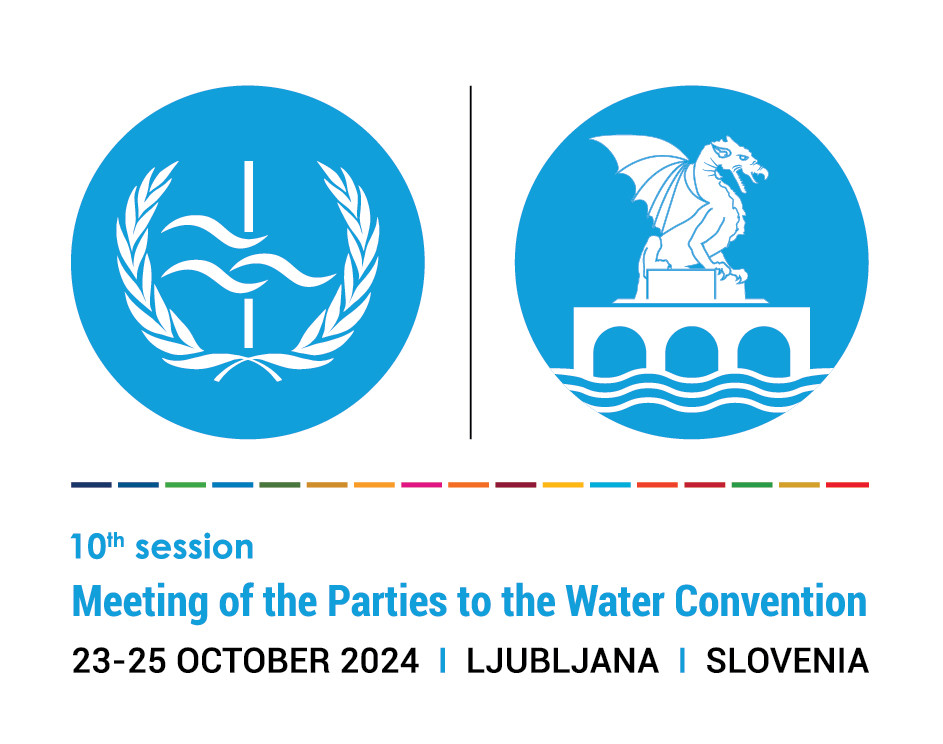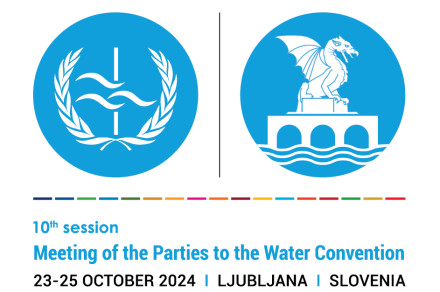Our Waters, Our Future: Transboundary Water Cooperation to Power Climate Resilience
The tenth session of the Meeting of the Parties to the Convention on the Protection and Use of Transboundary Watercourses and International Lakes (MoP 10), which operates under the auspices of the United Nations, will be held from 23rd to 25th of October at the Ljubljana Exhibition and Convention Centre. The centerpiece of the three-day event will be on October 23rd, when the official opening of the session will take place with high-level representatives and a celebration of the nine new countries that joined the Water Convention after the last session three years ago.
The meeting is expected to attract about 500 participants from 80 countries, including high-level representatives of states and international intergovernmental and non-governmental organizations. The agenda of the session will include a high-level segment, a general session and side events. The Prime Minister of the Republic of Slovenia, Dr. Robert Golob, will also address the audience.
Water is the most precious natural resource, central to our common future, a key component of our environmental, social and economic well-being. The availability of sufficient quantities of water of an adequate quality is one of the essential factors for ensuring peace and stability in the regions and in the world. Access to clean water is a central challenge of the 21st century. Water resources are under increasing pressure due to population growth, overuse and pollution.
Increasing climate change is causing increasingly frequent, intense, and widespread flooding on the one hand, and droughts on the other. Through his actions, man alters the water cycle, pollutes water and indirectly, also due to the increase in water temperature of surface waters and groundwater, changes aquatic ecosystems.
At the same time, countries do not communicate enough with each other about transboundary water topics and issues – according to the Water Convention reporting data, 40 percent of the world's population lives in transboundary river basins and catchments shared by 153 countries. Of these, less than 20 percent have developed and operational transboundary water agreements, which increases the risks of international disputes and conflicts.
At the meeting, Slovenia will take over from Estonia a three-year presidency of the twelve-member Bureau, the highest executive body of the Water Convention for the period 2024–2027. It will be chaired on behalf of Slovenia by Dr. Aleš Bizjak from the Ministry of Natural Resources and Spatial Planning.
Ahead of the meeting, he stressed: "Increasing climate resilience in international river basins is key to ensuring sustainable use of water in a reasonable and equitable way among countries, and thus peace and stability in a climate-provoked world. The key to collective climate resilience lies in developing cross-border water cooperation and mutual trust between countries, which is sometimes an incredibly difficult task."
Main Discussion – High Segment
The first day of the session will be dedicated to a special discussion within high-level segment on the topic Our Waters, Our Future: Transboundary Water Cooperation to Power Climate Resilience. High representatives of states, ministers, state secretaries, secretaries-general of international organizations will participate, and the discussion will be divided into three substantive sections.
The first panel discussion will focus on cross-border water cooperation for climate adaptation. The main messages, best practices, achievements and gaps in the field of climate resilience in transboundary river basins and river basins will be presented and commented on.
The second panel discussion will address cross-border cooperation for climate change mitigation through the substantive integration of the areas of water, food, energy and ecosystems. The need to strengthen cross-border integration between key sectors of sustainable development in a changing climate context will be highlighted.
The third panel will focus on strengthening climate resilience through cross-border protection and restoration of aquatic and water-related ecosystems and biodiversity. The central part of the panel will be a discussion on methods of protection and restoration, the importance of this type of cross-border action for the approach from the source to the sea, and the importance of connecting and managing water and forests.
Side events
The meeting will also be accompanied by 14 side events, which will be an opportunity to exchange opinions and experiences, ideas and examples of good practice between countries. The range of topics related to transboundary water management that will be addressed in the context of side events is diverse, including: the development of early warning systems, the introduction of new technologies for monitoring the status of transboundary river basins and river basins, the source-to-sea water management, the integration of the content and activities of sectors in climate resilience, the management of droughts in transboundary contexts, the cross-border protection and restoration of aquatic and water-related ecosystems and biodiversity; exchange of experience of international river commissions and water and peace on a global scale.
Special attention will be on Slovenian achievements in the field of advanced technologies developed by the Space-SI Centre of Excellence. The challenges of integrating new scientific and technological approaches to efficient support the management of ecosystems in river basins and related climate action will be the focus. The combination and integration of technologies such as Earth observation, remote sensing, artificial intelligence, and supercomputers make it possible to accurately predict and manage and mitigate water-related risks. Satellite technologies allow more effective management of transboundary river basins and faster analysis of our responses to natural disasters and climate change.



